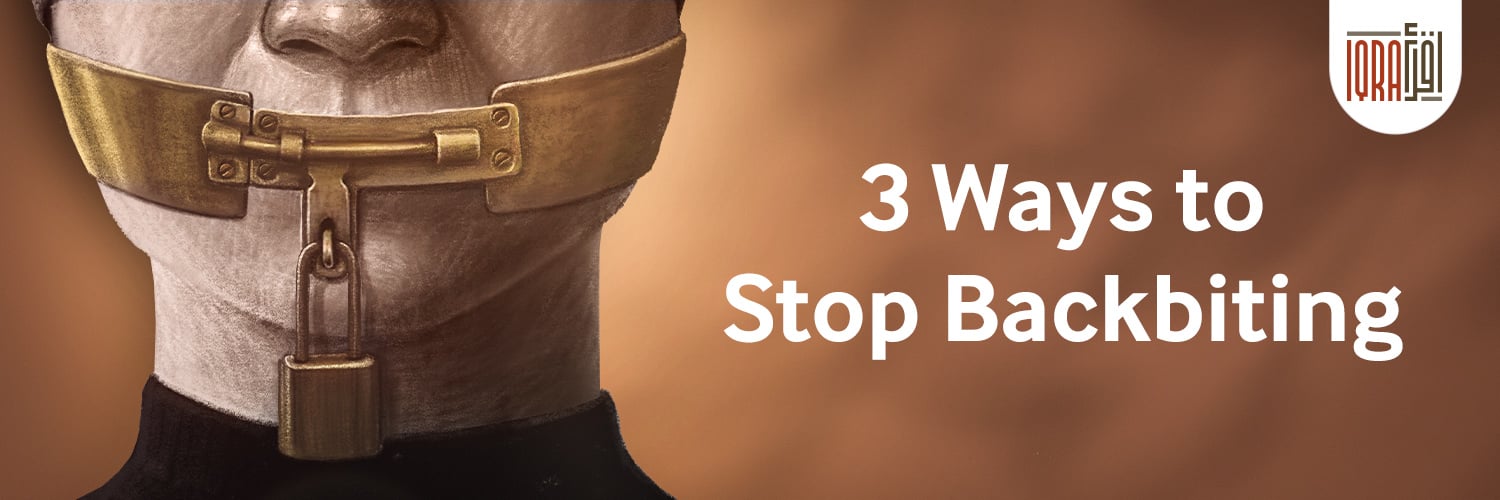How it Affects Us and Why We Need to Stop
Gheebat in Islam is backbiting.
And let’s face it, most of us are guilty.
True, some do it more than others, but it’s wrong no matter what. We tell ourselves, “I’m not going to say anything,” and as the conversation continues, we inevitably say things we regret. Sometimes we may not even realize we just committed backbiting or gheebat.
Other times, we aren’t sure if that’s really backbiting, just speaking the truth, or sharing a story.
What is considered gheebat in Islam?
The Arabic word for backbiting is gheebat. So, what exactly is it?
Through hadith, we learn it is saying something about a person they would not like, even if it’s true. On the other hand, if we say something untrue about a person they wouldn’t like, that’s called slander.
Abu Hurairah narrated that it was said: “O Messenger of Allah! What is backbiting?” He said: “Mentioning your brother with that which he does not like.” He said, “What if what I said about him is so?” He said: “If what you said about him is so, then you have backbitten him, and if it is not as you said, then you have slandered him.” (Jami` at-Tirmidhi 1934)
There are only six exceptions to backbiting: rectifying injustice, seeking to help change a wrong, requesting a fatwa, warning Muslims about evil, a person who publicizes their sin, and identification.
Is Backbiting a Major Sin?
Backbiting is a major sin. We often commit it without even realizing it, but the punishment for backbiting is tremendous!
Brotherhood (or sisterhood) is a huge part of Islam. Our religion is communal and requires us to look out for each other. Through the promise of Allah’s help and rewards, we’re encouraged to show kindness and support to one another. Even a smile is recorded as a charity. So, the reverse of this good behavior, such as backbiting, is strictly forbidden Gheebat often leads to people holding grudges against their relatives, and we know Islam warns against cutting ties with family members.
Backbiting leads to many evils within the community. It has contributed to the breakup of marriages and families and has caused mental breakdowns and turmoil.
It is narrated on the authority of Jabir that he heard the Prophet (peace be upon him say: A Muslim is he from whose hand and tongue the Muslims are safe. (Sahih Muslim 41)
It was narrated that Abu Musa said: “I said: ‘O Messenger of Allah, whose Islam is most virtuous?’ He said: ‘The one from whose tongue and hand the Muslims are safe.’ (Sunan an-Nasa’i 4999)
Through a hadith, we learn that that habit of backbiting can bar us from entering Jannah. It is also the reason someone was receiving punishments in the grave, as told to us by Prophet Muhammed (peace be upon him).
More Hadiths on Backbiting
Hudhaifah (RAA) narrated that the Messenger of Allah (peace be upon him) said: “A backbiter will not enter Paradise.” Agreed upon. (Book 16, Hadith 69)
Bahr bin Marrar narrated that his grandfather Abu Bakrah said: “The Messenger of Allah passed by two graves, and he said: ‘They are being punished, but they are not being punished for anything major. One of them is being punished because of urine, and the other is being punished because of backbiting.'” (Sunan Ibn Majah 349)
When the Prophet (peace be upon him) ascended to heaven, he passed by a group of people who were being tortured. He inquired who they were as they scratched their faces and chests with copper nails. The Prophet (peace be upon him) learned that these were people who used to backbite.
Anas (May Allah be pleased with him) said: The Messenger of Allah (peace be upon him) said, “During the Mi’raj (the Night of Ascension), I saw a group of people who were scratching their chests and faces with their copper nails. I asked, ‘Who are these people, O Jibril?’ Jibril replied: ‘These are the people who ate the flesh of others (by backbiting) and trampled people’s honor.”‘ (Riyad as-Salihin 1526 – Abu Dawud)
3 Ways to Stop Backbiting
The truth is that most of us aren’t trying to backbite our brother or sister in Islam. We sometimes speak out of frustration, anger, or possibly boredom, which doesn’t change the fact that we’re still backbiting. Knowing our mistakes will help motivate us to take the necessary steps to try to stop them.
1. Be Mindful of your Tongue
Holding our tongue is hard because we justify our speech by saying we’re “just getting it off our chest.” Frustrations and venting about people rarely result in finding a solution. So, understanding that we won’t make things better when we say something about people is the first step to controlling our tongue.
Shaytan is always trying to trap us in this quiet but major sin. He makes us think that gheebat is only if you have bad intentions, which is invalid. Gheebat in Islam is simply saying something about someone they won’t like. We might then say, “Well, how am I supposed to know what they like or not?” The answer is simple. Would you like it if someone said that about you when you weren’t around to clarify the statement?
The Prophet (peace be upon him) reminds us in many ahadith about guarding our tongue. Even though the sayings of the companions (RA), we are reminded of this. Here is advice from them that can benefit us in trying to control our tongue.
It is reported that Al-Ḥasan Al-Baṣri (RA) said: The intelligent person’s tongue is behind his heart: when he wants to speak, he first thinks. If [his words] will be in his favor, he says them, and if they will be against him, he does not speak. And the ignorant person’s heart is behind his tongue: when he merely thinks of saying something, he says it, whether for or against him.
(Abū Bakr Al-Daynūrī, Al-Mujālasah wa Jawāhir Al-‘Ilm article 2049.)
‘Ubadah ibn al-Samit reported: The Messenger of Allah, peace, and blessings be upon him, said, “Speak what is good and acquire gains, or refrain from speaking evil and be safe.” (Musnad al-Shihab al-Quḍāʻī 666)
2. Pray for Them
Many times, when we talk about others, it’s because we’re angry or dissatisfied. Speaking out about people in a manner they won’t like won’t make them better. Criticism is highly ineffective in solving any of our problems. Yet, we still fall into this trap. But prayer changes everything! So pray for them the next time you’ve wronged someone by opening your mouth to say something they won’t like (even if you didn’t mean anything wrong by it).
Rectify your heart and send duas their way to make up for your mistake. It replaces our wrongs with good and makes us accountable and mindful of our actions. This is a powerful shift.
Anas (RA) narrated that the Messenger of Allah (peace be upon him) said: “The atonement of backbiting a man is to ask Allah to forgive him.” Related by Al-Harith bin Abu Usamah with a weak chain of narrators. (Book 16, Hadith 81)
3. Socialize Less
Humans are social creatures; we need to interact with others. But how we socialize makes all the difference. If you’re sitting at the masjid or a friend’s house talking about Allah, then it’s positive. If you’re with a family member talking about other family members, you’re putting yourself in a bad situation.
Enjoying your own company is a great way to avoid idle socializing or “chilling.” There’s no purpose in “chilling,” and too many of those interactions lead to backbiting. The more we speak negatively about others, the more it affects our state of peace. So, while socializing is necessary, it should be done in moderation.
The hadith below is essentially the formula for success for a Muslim:
Uqbah ibn’ Amir reported: I said, “O Messenger of Allah, what will save us?” The Messenger of Allah, peace, and blessings be upon him, said, “Restrain your tongue, let your house be enough for you, and weep for your sins.” (Sunan al-Tirmidhī 2406)
As we become mindful of gheebat by understanding its definition and consequences, we can transform ourselves. We are moving closer to Allah in trying to be aware of our tongues. Building this consciousness will help protect us in the hereafter and give us peace in this life, inshallah.





0 Comments
Oops comments are disabled